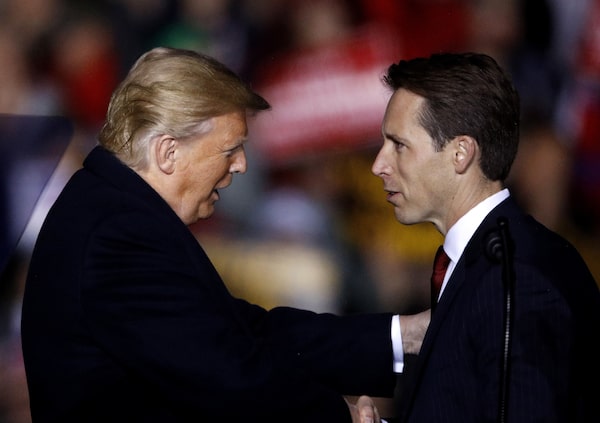
Senator Josh Hawley of Missouri, pictured with Donald Trump, has become the leading Capitol Hill critic of high-tech barons.Charlie Riedel/The Associated Press
The party that eliminated slavery is fighting the modern teaching of slavery’s legacy. The party that helped provide the margin of victory for the 1965 Voting Rights Act is widely accused of restricting voting. The party whose first elected president of the 20th century read so broadly in his first two years in the White House that he acknowledged his book list looked “in a superficial glance to be an Irish stew” is seeking to restrict what sits on school library shelves.
But perhaps the most astonishing change in the character of the Republicans is the one that has attracted the least attention, for leading elements of the political entity colloquially known as the party of Big Business quietly but decisively are turning against the captains of contemporary industry.
The Republicans – who delivered their presidential nominations to the businessmen Herbert Hoover (1928 and 1932), Wendell Willkie (1940) and Mitt Romney (2012), and who elected the only two presidents with business degrees, George W. Bush and Donald Trump – are seeking a “divorce” from big business.
This month former presidential candidate Marco Rubio, the Florida senator, criticized corporate leaders – whom he described as “the instrument of anti-American ideologies”– and suggested they be held legally liable “when they abuse their corporate privilege by pushing wasteful, anti-American nonsense.” A second 2016 presidential candidate, Senator Ted Cruz of Texas, has vowed he will “no longer accept money from any corporate” political action committee. And a potential 2024 GOP presidential candidate, Senator Josh Hawley of Missouri, has become the leading Capitol Hill critic of high-tech barons.
With this emerging change in the party’s character, the Republicans now can be regarded as a group that is in full transition from its 20th-century identity.
That identity has been firmly established for decades. Ronald Reagan (president, 1981-89) was in full embrace of big business, which he rewarded with rich tax preferences. The cabinet of Dwight Eisenhower (1953-61) was characterized as “eight millionaires and a plumber” – the latter being Marty Durkin, the labour secretary, the former head of the Plumbers’ Union – and his selection for defence secretary, General Motors chairman Charles E. Wilson, famously told his Senate confirmation hearing that “for years I thought what was good for our country was good for General Motors, and vice-versa.” And both George H.W. Bush and his son had strong business backgrounds, instincts and impulses.
Mr. Hawley’s proposed legislation, bearing the title of the Trust-Busting for the Twenty-First Century Act, provides ironic perspective on this new development. It was the Republicans Theodore Roosevelt (1901-09) and William Howard Taft (1909-13) who shook the GOP of William McKinley – who raised tariffs to protect American commerce and advocated “sound money” – from the party’s earlier pro-business moorings. The two embarked on a decade-long campaign to “bust” the trusts, the early 20th-century term for the huge corporations, such as John D. Rockefeller’s Standard Oil and J.P. Morgan’s Northern Securities, that grew out of the American surge toward industrialization.
That progressive impulse was co-opted by Woodrow Wilson (1913-21) and his Democrats, and a century ago, in the 1920s, the Republicans were led by three business-oriented presidents, Warren G. Harding, Calvin Coolidge and Mr. Hoover, an engineer who made a fortune in gold mining and finance and for eight years served as secretary of commerce.
In that context, the decision by Representative Ken Buck of Colorado, the lead Republican on the House antitrust subcommittee, to refuse to accept campaign donations from Big Tech firms and to urge GOP lawmakers to forswear contributions from Facebook, Google, Amazon, Apple and Twitter, marks a significant departure from form.
“Whether their behaviour is directed at potential competitors or at politicians and citizens they don’t agree with, these companies are able to act with complete impunity because of their status as monopolies,” Mr. Buck said. “Their respective monopolies have given them the power to police the marketplace of ideas and dictate what information and services consumers can see and use.”
Initiatives such as these are consistent with the party’s effort to lure blue-collar voters from the Democrats, who for decades beginning with the New Deal of the 1930s characterized their rivals as the captive of business interests.
“This is a significant change,” said Matthew Slaughter, a member of the Council of Economic Advisers in the George W. Bush administration and now the dean of the Tuck School of Business at Dartmouth College in New Hampshire. “But the dynamic forces of the global economy have not directly benefited workers. Many elected officials are responding to that.”
Republican officials, moreover, increasingly identify American corporations – which have embraced policies seeking diversity, equity and inclusion – with progressive social and cultural ideas at odds with the new cultural profile of the GOP.
“The ultimate way to stop the current Marxist cultural revolution among our corporate elite,” said Mr. Rubio, “is to replace them with a new generation of business leaders who consider themselves Americans, not citizens of the world.”
This anti-corporate movement also grows out of general unease about established institutions that businessman-turned-populist Mr. Trump reflected, and then sowed, in American culture.
“More and more billionaires are left-leaning, and at the same time many companies are taking on ‘woke’ agendas like diversity, equity and inclusion,’’ said Karl Moore of the Desautels Faculty of Management at McGill University in Montreal. “Corporations are increasingly ‘politically correct’ and that doesn’t sit well with Republicans.”
Our Morning Update and Evening Update newsletters are written by Globe editors, giving you a concise summary of the day’s most important headlines. Sign up today.
 David Shribman
David Shribman